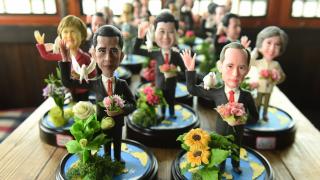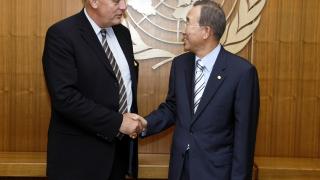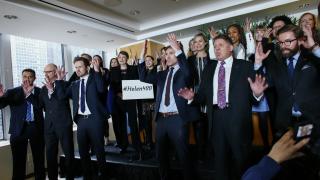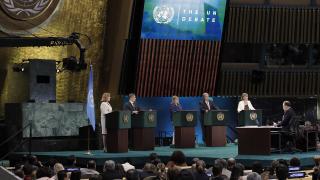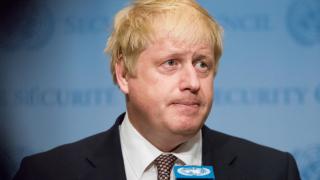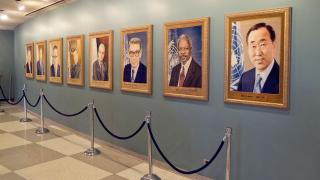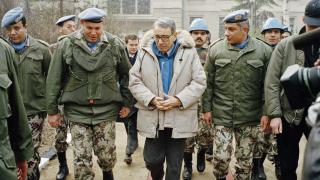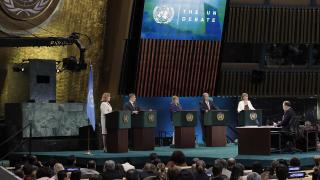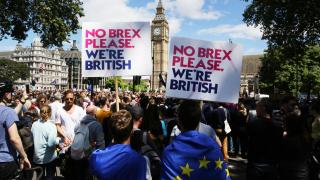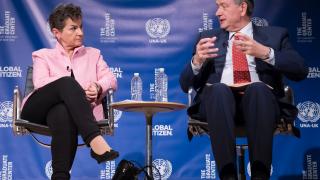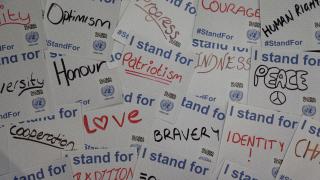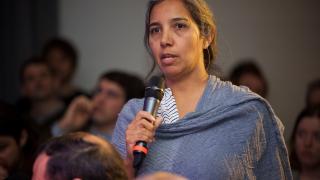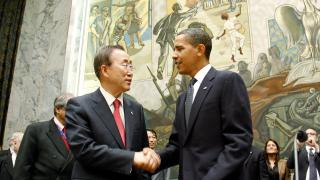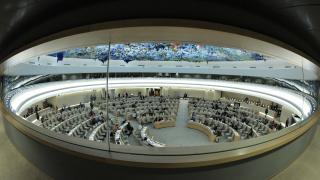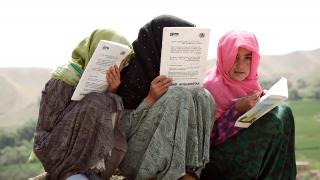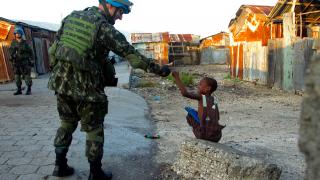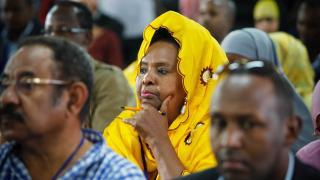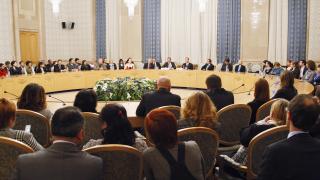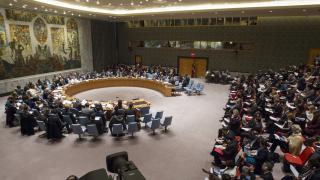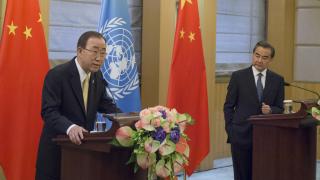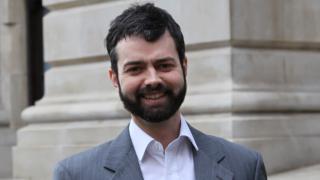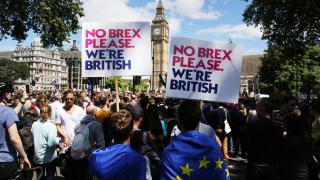
After five eventful years as Chairman of UNA-UK, Sir Jeremy Greenstock – who was succeeded on 1 July by Lord Wood of Anfield – talks to New World about the UK’s global role following the EU referendum, the 1 for 7 Billion campaign, why he worries about nationalism and why UNA-UK has been his antidote to “hell in a handcart” pessimism.
In the wake of the EU referendum, the UK is going through a period of uncertainty in terms of defining its global role. What role do you think the UK should be playing in international affairs, and at the United Nations in particular?
The UK has always been connected. There is danger after this vote that it will become less connected. I was a remainer, and one of the reasons that I was a remainer was that I believed that the UK had – perhaps of all the advanced democratic countries – the best mix of positions and relationships on the international stage. So it’s absolutely essential looking forwards that we keep up those relations, whatever the treaty relationship with our neighbours, and that we use the UN to show that we are good at helping the collective approach to solving global problems.
But there may be rhetorical and political attacks on our position as a permanent member of the Security Council: “Are you, Britain, not so reduced now from what you were in 1945, that you must resign your permanent seat?” We have got to earn our spurs back in the international institutions. That includes NATO, and our relationships with the other continental groups, as well as the big emerging nations. So, there’s an enormous amount of work to do to fill the gap in perception of what the UK wants to be and how people see us as after the referendum. The Foreign & Commonwealth Office is really going to have its work cut out and, to my mind, it needs a bigger budget for that.
Where do you think UNA-UK can have the most impact in this period of transition?
We must be realistic about our size and our reach – we are an under‑funded, tiny organisation. Against that background, the 1 for 7 Billion campaign has been an absolutely remarkable example of how the right concept, presented and followed up in the right way, can have an enormous impact on a wide swathe of the global public – all the way to the UN General Assembly. It doesn’t matter how small you are. If people see that what you’ve said is important, it can go viral. So I think UNA‑UK must look for the next campaign or campaigns that multiply the naturally small UNA‑UK voice, because we’ve clearly shown a capability to do that. We must also go on grinding away to raise the standards of the British Government on global issues. That’s very important – we represent all our members and supporters in that role.
You have supported UNA-UK’s 1 for 7 Billion campaign in bringing about changes to the way the UN Secretary-General (SG) is chosen. With a new leader due to be appointed at the end of this year, what do you think her – or his – top priorities should be?
The next SG has maybe the last opportunity, as the world goes on fragmenting, to hold the power and the appeal of the UN together. So there’s a very important leadership role which must concentrate on two things: one is to be a voice of moral authority that stands up to governments who aren’t behaving in ways that serve the global collective. And secondly, to prioritise her or his focus on a particular issue, rather as UNA‑UK is prioritising in its own strategic plan – that is, not to try and be all things to all people, but to delegate. The senior appointments the SG can make to UN agencies are part of his or her instrumental power in getting things done, so the SG must insist on member states sending really good candidates.
He or she must focus on those issues which the UN is capable of doing well – I think climate change is one of them; I don’t think he or she will be able to achieve UN Security Council reform. But in the areas where the UN is working reasonably well, they must raise the game, the energy, the action, because this may be a last‑chance period for an institution like the UN.
Photos: (top) March for Europe, London, 2 July 2016 © pixstory/Alamy Stock Photo (middle) Sir Jeremy Greenstock at UNA-UK’s UN Day reception in 2011 at Australia House © UNA-UK/Mark Makela
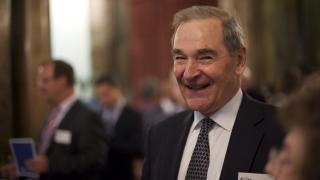
You were Britain’s ambassador to the United Nations at a particularly difficult moment in its history – the Iraq war. Today, terrorism, ongoing civil war in Syria and the current refugee and migrant crisis have caused many people to criticise the UN’s credibility. What preserves your faith in such an imperfect organisation?
I have no doubt in my mind that the UN is a marvellously invented organisation. It has made a real difference to our capacity as human beings to sustain a long period of relative global peace, because even difficult governments understand that there is room to talk before you turn to the gun or the rocket. The UN stands as a massive voice for decent behaviour in the modern world and I have absolute faith in that.
It’s the intergovernmental system that worries me. It’s nationalism, it’s the telling of untruths in order for regimes to hold onto power. In the West, I think we’ve been too reluctant to give up our position of superiority since the Second World War. But in the 21st century, power that matters – the good power that matters – is counted not in military capability, but through having a legitimate position of representing more than just your nation; representing humankind’s need to find solutions for shared problems. So I don’t think there’s room for a superpower any longer; I think we’re in a post‑superpower era. I’m not sure America is there yet, if you look at the presidential campaign, they’re still talking in anachronistic terms about making America great again. And even the Brexit campaign of ‘taking back control’, taking back our sovereignty – we never lost it. Sovereignty is a complex, mixed thing. For every bit of sovereignty we might have ‘conceded’ to Brussels, we gained something back because we had influence on other nations’ decisions.
What have you, personally, learnt from UNA-UK and its team?
More than you would imagine. I think what has been the greatest pleasure for me is learning first‑hand what the next generation’s perspective is. I’ve been really inspired, not just by your idealistic hopes that you’re going to change the world, but by the methodical way you’ve put together programmes to realise the realisable of those hopes. It’s natural for old fogeys like me to say “the world is going to hell in a handcart” and to some extent, it is. But it is up to you to stop that handcart.
What will you miss most about UNA-UK?
The people. Just people. Just wandering in and thinking “Ah I’ve had a bad time in the last meeting I’ve been to, but this lot are smiling, or this lot have their heads down on something…” It’s undoubtedly the people.
Is there anything that you would like to say to UNA-UK’s 15,000 members and supporters before you step down?
The first thing to say is thank you. You have been inspiring in your enthusiasm and I really have enjoyed travelling around the country and meeting with people. So there’s an obvious call to “keep going” – you mustn’t let this organisation down. But to the younger generation I would say, you’re going to have to cope with some of the bad things you’re inheriting from my generation, and I apologise for that. But you must, as early as you can, involve yourselves in action. You must think globally, but you must act locally. And as you learn what it takes to build a little team and persuade people, and broaden the ripples of your impact, you will learn how to do it at wider and wider levels. But if you just take a placard out onto the street and say “Change the climate”, you’re not actually doing anything useful. You’ve got to do something local that adds to the sum of things. Then, it will broaden as you get more responsibility in your career. That’s what I want to see this next generation doing.
Interview conducted by Isabelle Younane, Campaigns and Communications Officer, UNA-UK

